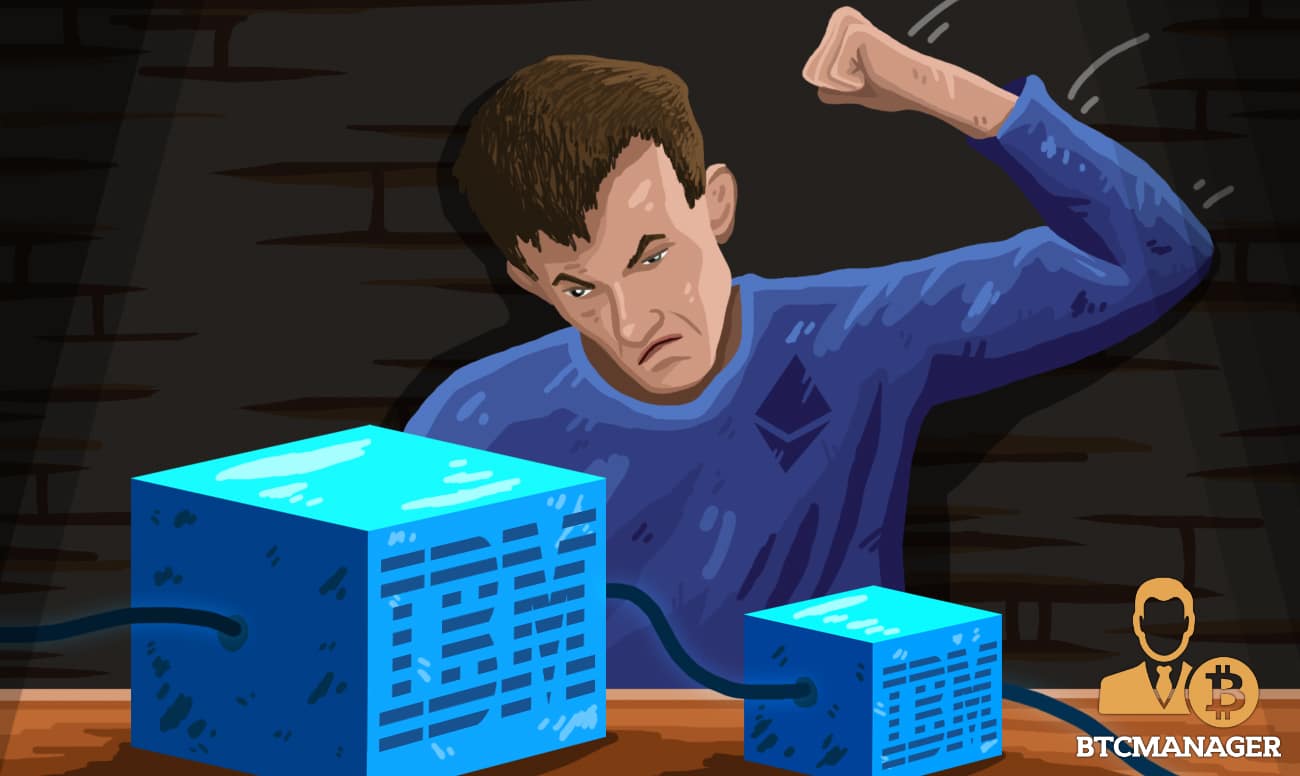Ethereum Cofounder Claims IBM Blockchain “Misses the Point”

Hosted in Prague, Czech Republic, Ethereum cofounder Vitalik Buterin kicked off Ethereum’s recent Devcon 4 conference by talking about the community’s fourth development phase, Serenity. Dubbed “Ethereum 2.0,” he claimrf that it is a “combination of a bunch of different features that we have been talking about for the past several years. We have been actively researching, building, and now, finally getting them all together.” Furthermore, since Serenity will finally allow Ethereum to move away from proof of work, Buterin believes that the network will be “1000x more scalable.”
IBM and Blockchain
In an interview with Quartz at the event, however, Buterin criticized IBM and other corporate entities for “missing the point” and “wasting time” with their enterprise blockchain offerings and services. Buterin was likely referring to IBM’s struggling TradeLens program, which aims to bring the logistics and supply chain industry under one common blockchain.
IBM initially partnered with shipping giant Maersk to build the platform. However, it has failed to establish any major partnerships since then.
Enterprise-grade blockchains have surged in popularity in recent years. IBM, in particular, was one of the first companies to adopt the technology and dedicate significant time and resources to understanding its applications. Most notably, it founded The Hyperledger Project in association with The Linux Foundation.
Hyperledger is meant to be “an open source collaborative effort created to advance cross-industry blockchain technologies.” Since its release in 2016, several other companies in the realm of finance and technology have joined as well, including Intel, American Express, Cisco, Accenture, and J.P. Morgan to name a few.
IBM’s research and development in the field of blockchain has allowed the company to offer a full stack blockchain-as-a-service (BaaS) platform on top of its IBM Cloud infrastructure. However, since the underlying blockchain and Hyperledger Fabric framework is managed wholly by IBM, it is a closed ecosystem. Furthermore, given that all nodes on IBM’s blockchain are controlled by the company, many believe that the aspects of decentralization and security are compromised.
However, IBM’s aforementioned TradeLens blockchain platform has been struggling for a different reason. According to industry sources, the company could not convince any major logistics companies to sign a deal primarily because the platform’s intellectual property rights lies with a rival, Maersk.
Missing the Point
Speaking specifically about corporate blockchain efforts, Vitalik Buterin told Quartz, “I read this CoinDesk article about some IBM blockchain thing. I don’t understand this deeply, but the detail that jumped out at me is they’re saying ‘Hey, we own all the IP and this is basically our platform and you’re getting on it.’ And like, that’s totally not the point.”
Besides TradeLens, IBM has also developed Food Trust, a blockchain effort designed to make the “world’s food supply chain safer, more efficient and more sustainable.” This essentially involves tracking a particular food item from farm to table, with its condition and quality recorded on a blockchain at the farming, processing, distribution, and retail levels. According to IBM, this will help consumers establish freshness and safety of a particular food while reducing waste and maximizing shelf life for retailers. When asked about his opinion on the platform, Buterin said,
“The potential value of tracking food on a blockchain is that you’d get QR codes stamped on the [food] at every step [along] the way, and you as a consumer can scan the code and get confirmation about ‘here is where the stuff came from.’ Like I can check if it complies with my own moral values or standards for quality and so forth. There’s definitely something there, but whether or not any of the actors there are doing it remotely correctly, I’m much less sure.”
Ethereum down 90 Percent
A Reddit post submitted to the cryptocurrency subreddit has meanwhile pointed out that the Ethereum cofounder has lost over $460 million within the past year. At current market rates, the blockchain explorer service Etherscan reveals that his wallet’s 355,003 ETH is worth approximately $39 million, a far cry from the $500 million figure of last year.
Launched in early 2014 as an initial coin offering (ICO), Ethereum was the first blockchain platform to support the development of decentralized applications and smart contracts. At the time, each ETH token was sold for around $0.31. The token sale ended up raising around $15.5 million and reaching its hard cap. In the time since ether has consistently ranked as the second most valuable cryptocurrency after bitcoin, trading blows with Ripple’s XRP for the position.
While ether reached an all-time high valuation of around $1,400 in January 2018, its price has since nosedived, similar to most other cryptocurrencies on the market. In fact, at the time of publication, ether sits at $97, which represents a dip of over 90 percent since it’s all-time high valuation. However, unlike the DAO hack that marred Ethereum’s reputation in June 2016, no specific incident can be blamed for this slump.
Nevertheless, Buterin’s wallet has seen no major activity throughout the year, signalling that he had no interest in selling his cryptocurrency holdings through the bear market. This is in stark contrast to Litecoin founder Charlie Lee who reportedly sold his entire LTC balance in December 2017. Citing a conflict of interest, Lee wrote:
“Whenever I tweet about Litecoin price or even just good or bad news, I get accused of doing it for personal benefit. Some people even think I short LTC!”
Serenity and Ethereum 2.0
Price concerns aside, Ethereum development continues to be progressing at a steady pace. In October 2018, Buterin and The Ethereum Foundation said that the “Constantinople” hard fork would be pushed back to early 2019.
Heralded as one of the biggest network upgrades in Ethereum’s lifecycle, Constantinople is slated to significantly improve transaction efficiency, reduce the reward per mined block and make the Ethereum network more resistant to ASIC miners. However, it will not introduce the long-awaited Casper protocol which will migrate to a proof-of-stake consensus mechanism.
Nevertheless, Vitalik Buterin continues his committment to the blockchain industry and the future of the Ethereum network. He summed up his mission at Devcon 4 with the statement:
“[Ethereum] Serenity is the ‘world computer’ as it’s really meant to be, not a smartphone from 1999 that can play snake.”














